沪教牛津版六年级知识点归纳(终审稿)
沪教牛津版六年级英语上册全册知识点点汇总
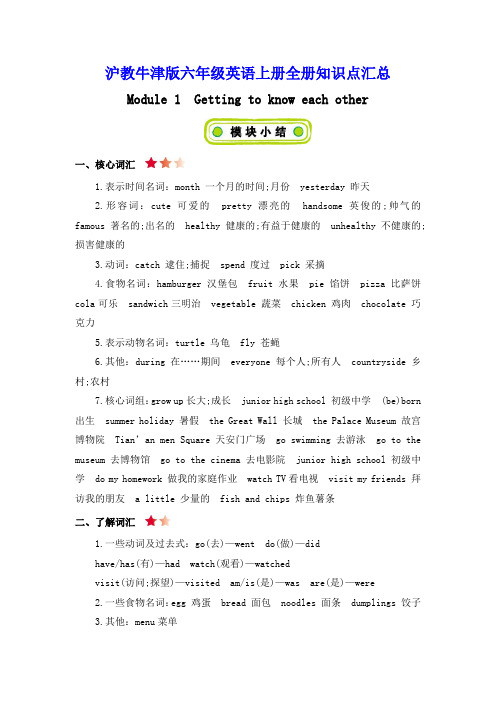
沪教牛津版六年级英语上册全册知识点汇总Module 1 Getting to know each other一、核心词汇1.表示时间名词:month 一个月的时间;月份yesterday 昨天2.形容词:cute 可爱的pretty 漂亮的handsome 英俊的;帅气的famous 著名的;出名的healthy 健康的;有益于健康的unhealthy 不健康的;损害健康的3.动词:catch 逮住;捕捉spend 度过pick 采摘4.食物名词:hamburger 汉堡包fruit 水果pie 馅饼pizza 比萨饼cola可乐sandwich三明治vegetable 蔬菜chicken 鸡肉chocolate 巧克力5.表示动物名词:turtle 乌龟fly 苍蝇6.其他:during 在……期间everyone 每个人;所有人countryside 乡村;农村7.核心词组:grow up长大;成长junior high school 初级中学(be)born 出生summer holiday 暑假the Great Wall 长城the Palace Museum 故宫博物院Tian’an men Square 天安门广场go swimming 去游泳go to the museum 去博物馆go to the cinema 去电影院junior high school 初级中学do my homework 做我的家庭作业watch TV看电视visit my friends 拜访我的朋友 a little 少量的fish and chips 炸鱼薯条二、了解词汇1.一些动词及过去式:go(去)—went do(做)—didhave/has(有)—had watch(观看)—watchedvisit(访问;探望)—visited am/is(是)—was are(是)—were2.一些食物名词:egg 鸡蛋bread 面包noodles 面条dumplings 饺子3.其他:menu菜单三、核心句型1.Her hair was short and her eyes were big. 她那时头发很短而且眼睛很大。
沪教牛津版六年级英语上册全册知识点点汇总

沪教牛津版六年级英语上册全册知识点汇总Module 1 Getting to know each other一、核心词汇1.表示时间名词:month 一个月的时间;月份yesterday 昨天2.形容词:cute 可爱的pretty 漂亮的handsome 英俊的;帅气的famous 著名的;出名的healthy 健康的;有益于健康的unhealthy 不健康的;损害健康的3.动词:catch 逮住;捕捉spend 度过pick 采摘4.食物名词:hamburger 汉堡包fruit 水果pie 馅饼pizza 比萨饼cola可乐sandwich三明治vegetable 蔬菜chicken 鸡肉chocolate 巧克力5.表示动物名词:turtle 乌龟fly 苍蝇6.其他:during 在……期间everyone 每个人;所有人countryside 乡村;农村7.核心词组:grow up长大;成长junior high school 初级中学(be)born 出生summer holiday 暑假the Great Wall 长城the Palace Museum 故宫博物院Tian’an men Square 天安门广场go swimming 去游泳go to the museum 去博物馆go to the cinema 去电影院junior high school 初级中学do my homework 做我的家庭作业watch TV看电视visit my friends 拜访我的朋友 a little 少量的fish and chips 炸鱼薯条二、了解词汇1.一些动词及过去式:go(去)—went do(做)—didhave/has(有)—had watch(观看)—watchedvisit(访问;探望)—visited am/is(是)—was are(是)—were2.一些食物名词:egg 鸡蛋bread 面包noodles 面条dumplings 饺子3.其他:menu菜单三、核心句型1.Her hair was short and her eyes were big. 她那时头发很短而且眼睛很大。
牛津上海版 六年级第二学期英语考点汇总
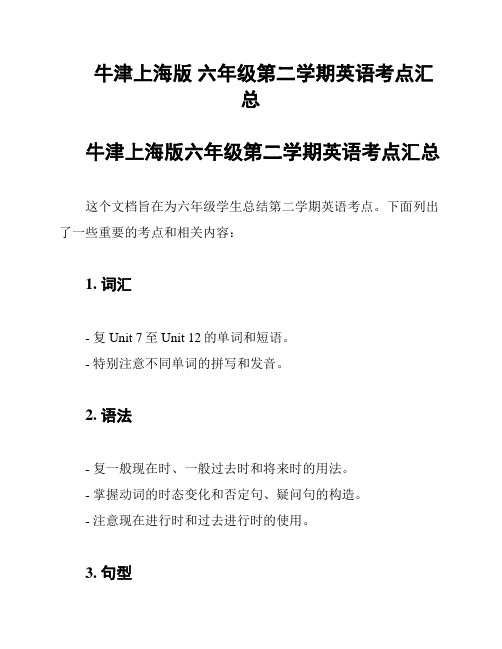
牛津上海版六年级第二学期英语考点汇
总
牛津上海版六年级第二学期英语考点汇总
这个文档旨在为六年级学生总结第二学期英语考点。
下面列出了一些重要的考点和相关内容:
1. 词汇
- 复Unit 7至Unit 12的单词和短语。
- 特别注意不同单词的拼写和发音。
2. 语法
- 复一般现在时、一般过去时和将来时的用法。
- 掌握动词的时态变化和否定句、疑问句的构造。
- 注意现在进行时和过去进行时的使用。
3. 句型
- 复基本句型:主语+谓语+宾语。
- 研究一些常用的短语和句型,如“Can you...?"、"I can't..."、"How often do you...?"等。
4. 阅读理解
- 阅读并理解课文中的重要信息和细节。
- 学会根据上下文猜测词义。
- 提高阅读速度和阅读理解能力。
5. 口语表达
- 多参与口语练,提高口语表达能力。
- 学会用英语进行日常交流,包括问候、介绍自己、描述事物等。
6. 听力训练
- 提高听力理解能力,通过听力练来听懂并理解对话和短文。
- 学会根据听到的内容回答问题。
以上是牛津上海版六年级第二学期英语的考点汇总。
希望这份文档对大家备考有所帮助。
祝你们考试顺利!。
牛津上海版英语六年级下学期知识点总结
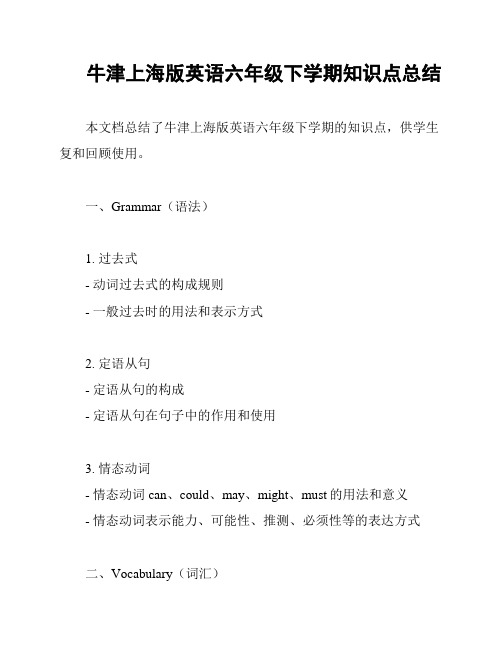
牛津上海版英语六年级下学期知识点总结
本文档总结了牛津上海版英语六年级下学期的知识点,供学生复和回顾使用。
一、Grammar(语法)
1. 过去式
- 动词过去式的构成规则
- 一般过去时的用法和表示方式
2. 定语从句
- 定语从句的构成
- 定语从句在句子中的作用和使用
3. 情态动词
- 情态动词can、could、may、might、must的用法和意义
- 情态动词表示能力、可能性、推测、必须性等的表达方式
二、Vocabulary(词汇)
1. 动词短语
- 动词短语的构成和用法
- 常用的动词短语及其意义
2. 名词短语
- 名词短语的构成和用法
- 常用的名词短语及其意义
3. 形容词和副词
- 形容词和副词的构成和用法
- 常用的形容词和副词及其意义
三、Reading(阅读)
1. 阅读理解
- 阅读理解题的解题技巧和策略- 阅读理解题型的种类和难度分布
2. 短文阅读
- 熟悉短文阅读中常见的词汇和句子结构
- 提高对短文主旨和细节的理解能力
四、Writing(写作)
1. 书信写作
- 书信写作的格式和语言表达
-如何正确使用称呼和结束语
2. 日记写作
- 日记写作的格式和内容要求
- 如何描述事件和个人感受
以上是牛津上海版英语六年级下学期的知识点总结。
希望同学们能够仔细复,并在考试中取得好成绩!。
沪教牛津版六年级知识点归纳
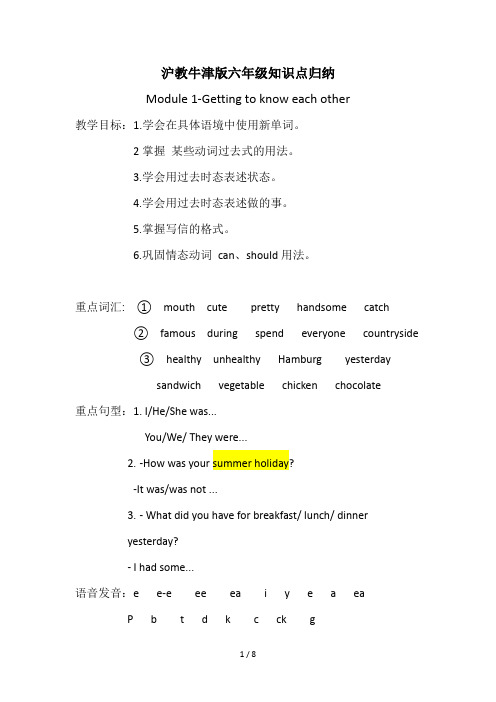
沪教牛津版六年级知识点归纳Module 1-Getting to know each other教学目标:1.学会在具体语境中使用新单词。
2掌握某些动词过去式的用法。
3.学会用过去时态表述状态。
4.学会用过去时态表述做的事。
5.掌握写信的格式。
6.巩固情态动词can、should用法。
重点词汇: ①mouth cute pretty handsome catch②famous during spend everyone countryside③healthy unhealthy Hamburg yesterdaysandwich vegetable chicken chocolate重点句型:1. I/He/She was...You/We/ They were...2.-How was your summer holiday?-It was/was not ...3.- What did you have for breakfast/ lunch/ dinneryesterday?- I had some...语音发音:e e-e ee ea i y e a eaP b t d k c ck gModule 2-Relationship教学目标:1.学会在具体语境中使用新单词。
2掌握某些动词过去式的用法。
3.学会用一般过去时的疑问句。
4.巩固wh - questions 在过去语态中的用法。
5.掌握数词hundred,thousand的用法。
6.巩固Would like to...句型和There be ...句型。
重点词汇: ①neighbour son daughter noisy dig② thousand hundred wild way die learn send③e-friend country other hobby重点句型:1. - Did you +动词原形+过去时间?- Yes,I did./ No,I didn’t.2.There was a...in the past.There were many...in the past.3.-Would you like to ...-Yes,I’d like to./No, I wouldn’t.语音发音 a ar u o ue u-e oo uf v thModule 3-Out and about教学目标:1.学会在具体语境中使用新单词。
牛津英语上海版六年级下册知识点整理

1.语音知识:包括元音字母的发音、辅音字母的发音、单词重音的规
律等。
学生需要掌握英语中的音标符号,能够准确地发音并辨认不同的音素。
2.词汇知识:该部分主要包括课本中出现的重点词汇和短语,如日常
生活用语、常见动词、形容词、名词等。
学生需要通过各种练习活动掌握
这些词汇,并能够在实际交流中运用。
3.语法知识:主要包括时态、语态、句型等方面的知识。
学生需要了
解英语的各种时态形式,以及用法和转换规则。
此外,还需要学习被动语态、祈使句和感叹句等特殊句型的用法。
4.阅读理解:该板块主要包括文章阅读、阅读理解和写作等。
学生需
要通过阅读文章,提高阅读理解能力,能够理解文章的主旨、细节和推理等。
同时,还需要练习写作,培养自己的写作能力。
5.句型和对话:该部分包括各种日常场景中常用的句型和对话,如问路、购物、学校生活等。
学生需要通过模仿和实践,掌握这些句型和对话,并能够在实际情境中灵活运用。
6.翻译:学生还需要学会将中文翻译成英文,并能够用英文表达常见
的句子和表达方式。
通过翻译的练习,可以提高学生的语言表达能力和思
维逻辑能力。
7.听力训练:学生需要通过听力训练提高自己的听力理解能力。
通过
听音填词、听音选图、听音选句等练习,加强对英语听力的感知和理解。
沪教牛津版(深圳)英语六年级全册知识总结

尚学吧六年级英语期末复习重点一.冠词a、an、the:a和an的区别:an用于元音音素(一般就是元音字母aeiou)前,a用于辅音音素前。
the用于特指。
例如:an orange 一只桔子 a cat一只猫the earth这个地球二介词1.表示时间的介词(1)at:用于表示时刻,时间的某一点。
at noon在午时at night在夜间at present目前(2)on:用于星期,某天,某一天的上午、下午、晚上(指具体的某一天时,一律用on)on Sunday在星期天on sunday morning 在星期天的上午on march 8 在3月8日(3)in:用于表示周、月、季节、年、泛指上午、下午、晚上。
in 1999 在1999年in November 在11月份in summer 在夏季in the afternoon在下午at表示片刻时间;in表示一段时间;on总是与日子有关。
2.表示地点的介词(1)at:在某地点(表示比较狭窄的场所)at school上学at home在家at the station 在火车站(2)in:在某地(表示比较宽敞的场所)she will arrive in shanghai at ten .10点她将到达上海。
3.方位介词:in, on, under, behind, near..….1). in表示"在……中","在……里面"。
例如in our class 在我们班上in my bag 在我的书包里in the classroom 在教室里2). on 表示"在……上"、"在……表面"。
例如on the wall 在墙上on the desk 在桌子上on the blackboard 在黑板上3). under表示"在……下"。
例如under the tree 在树下under the chair 在椅子下under the bed 在床下4). behind表示"在……后面"。
牛津上海版六年级知识点总结精编
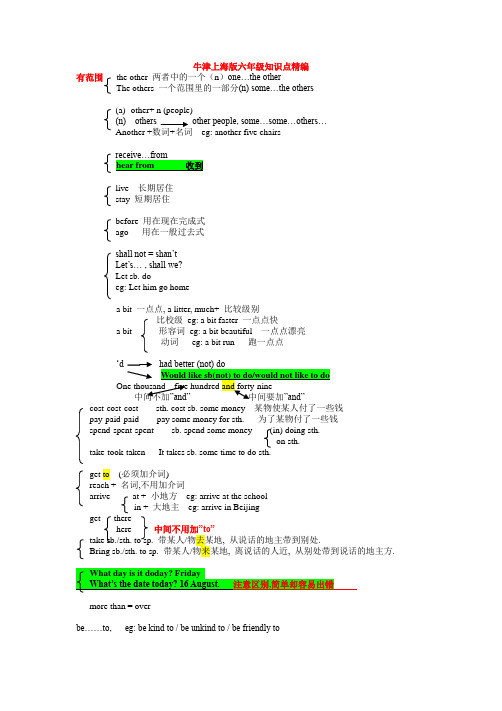
牛津上海版六年级知识点精编有范围the other 两者中的一个(n)one…the otherThe others 一个范围里的一部分(n) some…the others(a)other+ n (people)(n) others other people, some…some…others…Another +数词+名词eg: another five chairslive 长期居住stay 短期居住before 用在现在完成式ago 用在一般过去式shall not = shan’tLet’s… , shall we?Let sb. doeg: Let him go homea bit 一点点, a litter, much+ 比较级别比校级eg: a bit faster 一点点快a bit 形容词eg: a bit beautiful 一点点漂亮动词eg: a bit run 跑一点点‘d had better (not) doWould like sb(not) to do/would not like to doOne thousand five hundred and forty-nine中间不加”and” 中间要加”and”cost-cost-cost sth. cost sb. some money 某物使某人付了一些钱pay-paid-paid pay some money for sth. 为了某物付了一些钱spend-spent-spent sb. spend some money (in) doing sth.on sth.take-took-takenget to (必须加介词)reach + 名词,不用加介词arrive at + 小地方eg: arrive at the schoolin + 大地主eg: arrive in Beijingget therehere 中间不用加”to”take sb./sth. to sp. 带某人/物去某地, 从说话的地主带到别处.Bring sb./sth. to sp. 带某人/物来某地, 离说话的人近, 从别处带到说话的地主方.more than = overbe……to, eg: be kind to / be unkind to / be friendly tosave…from 从……救出……一般将来式……if + 一般现在式. eg: I will go to the park if it dosen’t rain tomorrow.情态动词…… eg: I must go to school if it doesn’t rain tomorrow.slowly, quickly. 都是两音节的, 但它们比较级都是加”more”的.eg: more slowly, ……come back = return / go backcome back from sp.Write sth. to sb. = write sb. sthHave a wonderful time = have a good time = enjoy oneselfBe interested in sth.doing sth.用现在完成式How long……?talk with/to sb. about sth. 可以互换healthy(a.) unhealthy (a.)healthier than less healthy thanexciting 形容物eg: The book is exciting.Excited 形容人eg: Kitty is excited.visit n. a visit to sp. eg: a visit to Beijing.v. visit sp. eg: visit Beijing.leave sth. sp. (in my home) (leave-left-left) leave:遗忘,遗留forget sth. (forget-forgot-forgotten)forget to do 忘记没有做的事(别人提醒)doing 忘记已做过的事remember to do 记住没有做的事doing 记住已做过的事lovely a.n. + ly a.a.+ ly ad. eg: careful (a.)+ ly carefully(ad.)keep……as…… 保留……作为…… (keep-kept-kept)prefer doing sth1 to doing sth2prefer sth1 to sth2eg: I prefer apples to bananas.更喜欢也喜欢(prefer-preferred)keep 延续性动词eg: I have kept this book for a week.borrow 瞬间动词eg: I borrowed this book a week ago.give sb. sth. give sth. to sb. (give-gave-given)danger (n)dangerous (a) safe (a)However,…………, however, ………… , but ……=Though …… , …… 这两个不能同时出现在同一个句子中.eg: You got up early this morning, but you were late for school.eg: Though you got up early this morning, you were late for school.this morning 用一般过去式this afternoon 用一般将来式I am ill. (be动词+表语, ill 只能做表语)sick 定语/表语eg: sick animals; He is sick; (sick 也可以表示晕船) in + 一段时间, 必须用将来式. eg: in twenty minutes, in a week……too……to…… 太……以至于不能……eg: too expensive for me to buy. 对于我来说太贵了以至于不能买.keep sb./sth. + a.(如:warm / safe)help sb. (not) to dohelp sb. dolet sb. doon one’s way to sp.on one’s way home by the way : 顺便miss-missed-missed , lose-lost-lost , (顺便学一下loose-loosed-loosed , 释放) missing = lost用”ing”形式做adj. 用动词过去分词做adj.cross (v) …… + (adv) safely, carefullyacross (prep) walk across the roadsheep, fish, deer, Chinese, Japanese 单复数同形take careful(a) care(n) of 形容词放在名词之前take care of …carefully 副词放在最后,修饰动词carefully take care of… 副词也可放在动词前Where……? At…… “where”提问, 回答一定要有介词.May I speak to……? 想要叫某人来接电话.Who is that? / Is that ……? 问对方是谁.This is …… 介绍自己be made of / from +原材料in…… + 地点for example + 完整的句子such as + 单词,词组raise money 收集钱款raise dogs 养狗six millionmillions of + 可数名词复数(注意million的变化)most of students are…… half of the apple isthe water is…… apples arethe USA, the UK…… 国家缩写前要加”the”There are also people come from…… (一句句子中谓语只能有一个)There are also people who comes from…… (宾语从句)There are also people coming from……用形容词The British(总称,复数) 不能用”How many the British……? ×British people 形容词+ 名词Britishers (Englishman, Englishwoman)listen (to music) (listen:不及物动词) look at sth. (look: 不及物动词) hear music(sth.) (hear: 及物动词) see sth. (see: 及物动词) make sb. +a+v make a living 谋生In another country = in other countriessend sb. sth = send sth. to sb. send-sent-sentbe done 被动语态We call the boy Tom.The boy is called Tom by us.fill sth1 with sth2 (eg: fill the bag with books 用书来填充书包)be filled withbe full of = be crowded withkeep your eyes closedopenWhat does the word mean?What’s the meaning of this word?How nice(a) the park is!How fast(ad) Peter is running!be on (电影)上映Which film is on in the cinema now?be located = lie 位于lie-lay-lain 躺着, 说谎, 位于lay-laid-laid 放置, 铺设, 产卵protect……from…… 保护……免受…… write to sb. 写给某人further 抽象, further study 进一步深造farther 具体the same +n + as be different fromas +a. + ashave sth. to do 有某事要做, make great progress 取得进步long before 很久以前before long 不久What’s the matter(n) with you?Wrong(a)enjoy doing sth. = like doing sth.asleep 熟睡sleepy 疲倦的提问时,”When” 在前, “Where”在后回答时,”Where” 在前, “When”在后like……better…… prefer = like betterprefer……to…… prefer preferredfavourite…… prefer……to…… = like better……than……hope to dothat + sb. + 将来式(in the) north-east of……In the east of China 在中国的东部(在范围之内)Beijing is north of Shanghai 北京在上海的北部(在范围之外)go, come, leave 用现在进行式表示一般将来式on + 具体某一天eg: on the morning of Oct. 25thin + 月份/年份at + 时间enjoylike/ love to do sth.finish +doing sth.practiceIt is important for sb. to do sth.形式主语主语Sth. be important to sb.主语You were watching TV at eight last night.过去具体时间点用过去进行式two-thirds 前面是基数词, 后面是序数词, 如果基数词是≥2的,那么序数词要加”s”invite sb. to do sth. 邀请某人做某事What (job) do you do?问职业Wath’s your job?What are you?different from the same……as……difference between可数,不可数都可以the same……as 与……相同move……to…… 把……搬到……protect……from 保护……使免受……keep……from 保护……免遭……prevent……from 阻住……使免受……It’s time for doing sth.sth.It’s time to do sth.life lives 生命(可数)life 生活(不可数)wish……I will 我希望……wish sb. sth. 这个愿望是奢望make sb. dosb. / sth. + adj. eg: make our city beautiful.Would you please……Would rather (not)…… + doHad better (not)……Would you like + to doat ChristmasChristmas Eveon New year’s eve on time 准时+……day (具体的日子) in time 及时both……and……are= not only……but also 主语+ 谓语(就近原则)eg: Not only they but also Mary likes to go to school.复数就近原则,likes跟Mary变化be afraid = be frightenedget on/ off a busget into /out off a car/taxitake care of = look after = care for名词动词Immediately = at oncePerhaps = possibly = maybe(adv.)two days later 用在过去式after two daysin two days 用在将来式towards 更强调方向性toquite a few 许多many / mucha lot of / lots ofplenty ofShall we……?=Why not……?= why don’t we……?Knowledge, traffic, information, news, weather, furniture, work, 不可数名词buy sth. from sp./sb.buy sth. for sb./sth.bring sth.to sb. 带来(离说话人近)take sb./sth. to sp./sb. 带去(离说话人远)keep one’s eyes openclosed (动词过去分词做形容词)I go to school every day 名词短语,多用作时间状语。
牛津上海版(深圳)英语六年级总复习知识点总结

总复习要点1•.句子汇总1. 否定句标志:nOt, n0, n ',不”。
2. 特殊疑问句必用疑问词。
疑问词:What 什么,Who 谁,whose 谁的,WhiCh 哪个,When 什么时候,Why 为什么, Where 哪里,how 怎样,how ofte n 多常,how Iong 多长,how far 多远, hoW old多少岁,how many 多少, how much 多少钱。
3. 一般疑问句①Be- (Am/ Is/Are/Was/Were …?)肯定回答:Yes,…is/are/was/were.否定回答:No,…isn 't∕aren 'wasn 'weren '.年前有地铁吗?女口:1. --Was there a SUbWay 50 years ago?50--Yes, there was. 是的,有。
--No, there WaSn '不,没有。
2. -- Am I wrong? 我错了吗?肯定回答:-Yes, you are. 否定回答:-No, you aren '②--Do/Does/Did …?肯定回答:Yes,…do/does/did.否定回答:No,…don 'doesn 'didn '如: Did you find SOmething?你找到什么东西了吗?--Yes, I did.是的,我找到了--No, I didn '不,我没找到。
③一Can/Could/Will/Would/ShaIl∕Should∕Must∕Ma y …?肯定回答:Yes,….Can / could∕will∕would∕shall∕ ShOUId∕must∕may.否定回No, ∙∙∙can ' / couldn ' won 'wouldn 'shan ' shouldn 't /needn ' mustn ' 2-1-c-n-j-y如:-Can We talk to Grandma? 我们能和奶奶说话吗?--Yes, We can. 是的,我们能。
上海牛津英语六年级上下册全知识点梳理
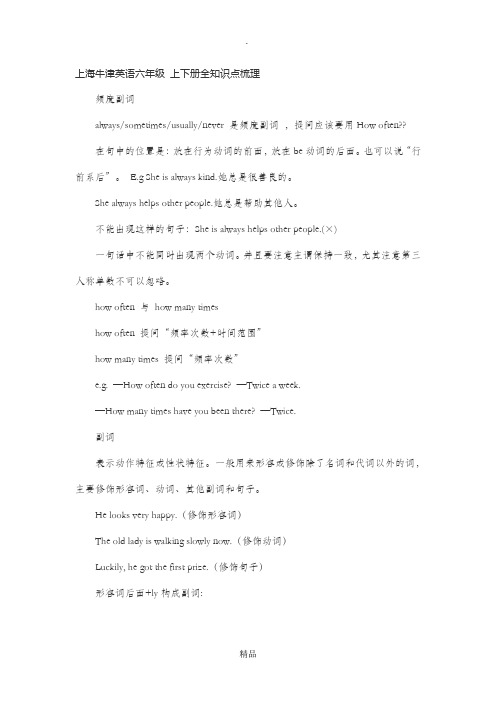
上海牛津英语六年级上下册全知识点梳理频度副词always/sometimes/usually/never 是频度副词,提问应该要用How often??在句中的位置是:放在行为动词的前面,放在be动词的后面。
也可以说“行前系后”。
E.g She is always kind.她总是很善良的。
She always helps other people.她总是帮助其他人。
不能出现这样的句子:She is always helps other people.(×)一句话中不能同时出现两个动词。
并且要注意主谓保持一致,尤其注意第三人称单数不可以忽略。
how often 与how many timeshow often 提问“频率次数+时间范围”how many times 提问“频率次数”e.g. —How often do you exercise? —Twice a week.—How many times have you been there? —Twice.副词表示动作特征或性状特征。
一般用来形容或修饰除了名词和代词以外的词,主要修饰形容词、动词、其他副词和句子。
He looks very happy.(修饰形容词)The old lady is walking slowly now.(修饰动词)Luckily, he got the first prize.(修饰句子)形容词后面+ly构成副词:slow—slowly slight—slightly quick—quicklycareful—carefully fierce—fiercely immediate—immediatelygentle—gentlylucky—luckilyhappy—happily介词What else do you do with your??你和你的?还干什么?With是个介词,后面接人称代词时,要用宾格的形式。
沪教牛津版六年级英语下册全册知识点清单汇总
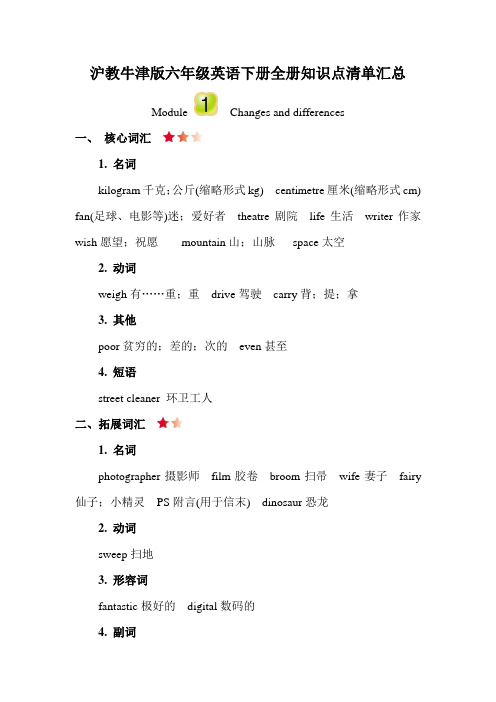
沪教牛津版六年级英语下册全册知识点清单汇总Module Changes and differences一、核心词汇1. 名词kilogram千克;公斤(缩略形式kg)centimetre厘米(缩略形式cm) fan(足球、电影等)迷;爱好者theatre剧院life生活writer作家wish愿望;祝愿mountain山;山脉space太空2. 动词weigh有……重;重drive驾驶carry背;提;拿3. 其他poor贫穷的;差的;次的even甚至4. 短语street cleaner 环卫工人二、拓展词汇1. 名词photographer摄影师film胶卷broom扫帚wife妻子fairy 仙子;小精灵PS附言(用于信末)dinosaur恐龙2. 动词sweep扫地3. 形容词fantastic极好的digital数码的4. 副词online在线地;在线的5. 代词themselves他们自己;她们自己;它们自己6. 其他taller更高的7. 短语go fishing去钓鱼enjoy oneself玩得愉快;得到乐趣get …in 收割street sweeper扫地车by hand用手right away立即;马上in a short time很快head teacher 校长 a piece of一张;一片have a picnic去野餐better and better越来越好三、核心句型1. I’m 150 centimetres tall. 我身高150厘米。
解读:这是介绍身高的句型。
“主语+ be动词+ 数字+ 长度单位(+ tall).”可以用来介绍某人的身高。
举一反三:My cousin is 154 centimetres tall. 我的堂弟身高154厘米。
Jim is 149 centimetres tall. 吉姆身高149厘米。
2. There are a lot of tall buildings in the city. 城市里有很多高大的建筑物。
上海版牛津英语六年级(上下)全重点知识点复习整理

上海版牛津英语六年级(上下)全重点知识点复习整理上海版牛津英语六年级(上、下)全重点知识点复习整理上海牛津英语六年级上下册全知识点梳理频度副词always/sometimes/usually/never是频度副词,提问应该要用howoften??在句中的边线就是:放到犯罪行为动词的前面,放到be动词的后面。
也可以说道“行前系后”。
e.gsheisalwayskind.她总是很正直的。
shealwayshelpsotherpeople.她总是帮助其他人。
不能出现这样的句子:sheisalwayshelpsotherpeople.(×)一句话中无法同时发生两个动词。
并且必须特别注意主谓保持一致,尤其特别注意第三人称单数不可以忽略。
howoften与howmanytimeshowoften回答“频率次数+时间范围”howmanytimes回答“频率次数”e.g.―howoftendoyouexercise?―twiceaweek.―howmanytimeshaveyoubeenthere?―twice.副词则表示动作特征或性状特征。
通常用以形容或润色除了名词和代词以外的词,主要润色形容词、动词、其他副词和句子。
helooksveryhappy.(润色形容词)theoldladyiswalkingslowlynow.(修饰动词)luckily,hegotthefirstprize.(修饰句子)形容词后面+ly构成副词:slow―slowlyslight―slightlyquick―quicklycareful―carefullyfierce―fiercelyim mediate―immediatelygentle―gentlylucky―luckilyhappy―happily介词whatelsedoyoudowithyour??你和你的?还干什么?with就是个介词,后面直奔人称代词时,必须用宾格的形式。
牛津上海 六年级知识点
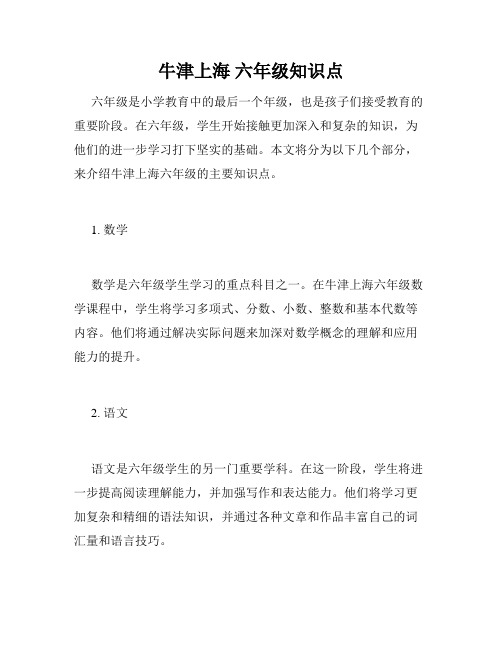
牛津上海六年级知识点六年级是小学教育中的最后一个年级,也是孩子们接受教育的重要阶段。
在六年级,学生开始接触更加深入和复杂的知识,为他们的进一步学习打下坚实的基础。
本文将分为以下几个部分,来介绍牛津上海六年级的主要知识点。
1. 数学数学是六年级学生学习的重点科目之一。
在牛津上海六年级数学课程中,学生将学习多项式、分数、小数、整数和基本代数等内容。
他们将通过解决实际问题来加深对数学概念的理解和应用能力的提升。
2. 语文语文是六年级学生的另一门重要学科。
在这一阶段,学生将进一步提高阅读理解能力,并加强写作和表达能力。
他们将学习更加复杂和精细的语法知识,并通过各种文章和作品丰富自己的词汇量和语言技巧。
3. 英语英语是牛津上海六年级的必修科目。
学生将学习更加高级的语法知识、阅读理解和词汇。
他们将通过与外教的互动和实际应用,提升自己的口语和听力能力。
4. 自然科学自然科学包括物理、化学和生物等学科,也是六年级学生必修的内容。
在这一阶段,学生将学习更加复杂的科学知识,如天文学、地理学和生态学等。
他们将通过实验和观察来深入理解自然界的规律和现象。
5. 社会科学社会科学包括历史、地理和社会学等学科。
六年级学生将学习国内外历史和地理的基本知识,了解不同文化背景和社会制度的差异。
他们将通过阅读和讨论,培养自己的思考和批判性思维能力。
6. 美术和音乐美术和音乐是培养学生创造力和审美能力的重要课程。
在六年级,学生将通过绘画和音乐表演来锻炼自己的艺术才华和艺术表现力。
他们将学习绘画技巧、音乐理论和乐器演奏等。
总结:六年级是学生接受小学教育的最后一年,也是他们建立知识体系和学术基础的关键时期。
通过学习牛津上海六年级的各个科目,学生将全面发展自己的认知能力、语言表达能力和创造力。
这将为他们进入初中阶段提供坚实的基础,并在未来的学习和成长中大放异彩。
上海版牛津英语六年级全重点知识点复习整理[资料]-9页文档资料
![上海版牛津英语六年级全重点知识点复习整理[资料]-9页文档资料](https://img.taocdn.com/s3/m/9e929fbe680203d8ce2f24a9.png)
上海牛津英语六年级上下册全知识点梳理频度副词always/sometimes/usually/never 是频度副词,提问应该要用How often…?在句中的位置是:放在行为动词的前面,放在be动词的后面。
也可以说“行前系后”。
E.g She is always kind.她总是很善良的。
She always helps other people.她总是帮助其他人。
不能出现这样的句子:She is always helps other people.(×)一句话中不能同时出现两个动词。
并且要注意主谓保持一致,尤其注意第三人称单数不可以忽略。
how often 与how many timeshow often 提问“频率次数+时间范围”how many times 提问“频率次数”e.g. —How often do you exercise? —Twice a week.—How many times have you been there? —Twice.副词表示动作特征或性状特征。
一般用来形容或修饰除了名词和代词以外的词,主要修饰形容词、动词、其他副词和句子。
He looks very happy.(修饰形容词)The old lady is walking slowly now.(修饰动词)Luckily, he got the first prize.(修饰句子)形容词后面+ly构成副词:slow—slowly slight—slightly quick—quickly careful—carefully fierce—fiercely immediate—immediately gentle—gently lucky—luckily happy—happily介词What else do you do with your…?你和你的…还干什么?With是个介词,后面接人称代词时,要用宾格的形式。
沪教版牛津英语六年级上册知识要点总结
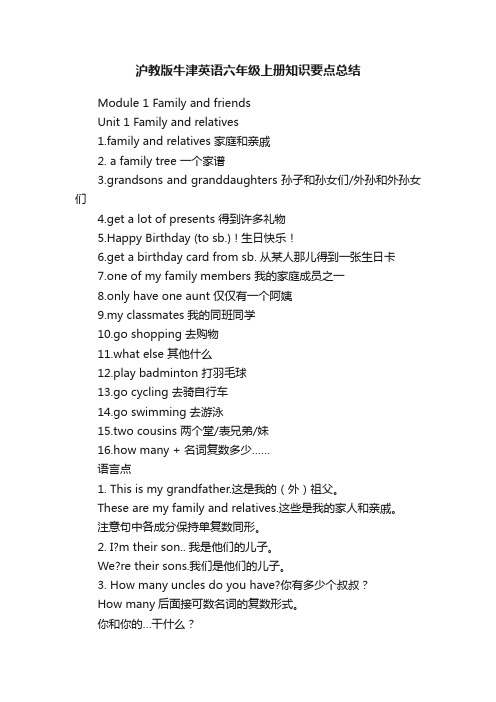
沪教版牛津英语六年级上册知识要点总结Module 1 Family and friendsUnit 1 Family and relatives1.family and relatives 家庭和亲戚2. a family tree 一个家谱3.grandsons and granddaughters 孙子和孙女们/外孙和外孙女们4.get a lot of presents 得到许多礼物5.Happy Birthday (to sb.) ! 生日快乐!6.get a birthday card from sb. 从某人那儿得到一张生日卡7.one of my family members 我的家庭成员之一8.only have one aunt 仅仅有一个阿姨9.my classmates 我的同班同学10.go shopping 去购物11.what else 其他什么12.play badminton 打羽毛球13.go cycling 去骑自行车14.go swimming 去游泳15.two cousins 两个堂/表兄弟/妹16.how many + 名词复数多少……语言点1. This is my grandfather.这是我的(外)祖父。
These are my family and relatives.这些是我的家人和亲戚。
注意句中各成分保持单复数同形。
2. I?m their son.. 我是他们的儿子。
We?re their sons.我们是他们的儿子。
3. How many uncles do you have?你有多少个叔叔?How many后面接可数名词的复数形式。
你和你的…干什么?4. What do you do with your…?你和你的…还干什么?5. What else do you do with your…?你和你的…还干什么?With是个介词,后面接人称代词6. What else do you do with your…?时,要用宾格的形式。
沪教版6A牛津英语期末知识点整理(OK!OK!OK!OK!OK!)
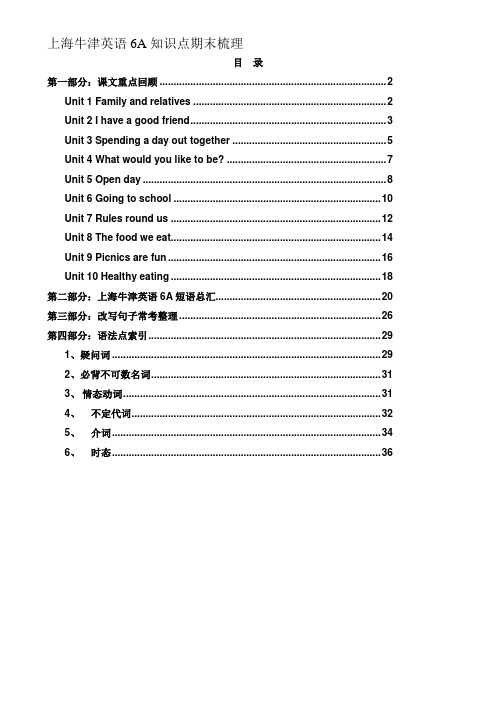
上海牛津英语6A知识点期末梳理目录第一部分:课文重点回顾 (2)Unit 1 Family and relatives (2)Unit 2 I have a good friend (3)Unit 3 Spending a day out together (5)Unit 4 What would you like to be? (7)Unit 5 Open day (8)Unit 6 Going to school (10)Unit 7 Rules round us (12)Unit 8 The food we eat (14)Unit 9 Picnics are fun (16)Unit 10 Healthy eating (18)第二部分:上海牛津英语6A短语总汇 (20)第三部分:改写句子常考整理 (26)第四部分:语法点索引 (29)1、疑问词 (29)2、必背不可数名词 (31)3、情态动词 (31)4、不定代词 (32)5、介词 (34)6、时态 (36)第一部分:课文重点回顾Unit 1 Family and relatives1. This is my grandfather.这是我的(外)祖父。
These are my family and relatives.这些是我的家人和亲戚。
2. I’m their son.. 我是他们的儿子。
We’re their sons.我们是他们的儿子。
3. sth. from sb.某物来自某人。
This is a birthday card from my friend.这是一张来自我朋友的生日卡片。
4. Happy birthday to sb.祝某人生日快乐。
5. one of your family members你的家庭成员之一。
one of后面应接可数名词的复数形式。
6. How many uncles do you have?你有多少个叔叔?How many后面接可数名词的复数形式。
- 1、下载文档前请自行甄别文档内容的完整性,平台不提供额外的编辑、内容补充、找答案等附加服务。
- 2、"仅部分预览"的文档,不可在线预览部分如存在完整性等问题,可反馈申请退款(可完整预览的文档不适用该条件!)。
- 3、如文档侵犯您的权益,请联系客服反馈,我们会尽快为您处理(人工客服工作时间:9:00-18:30)。
沪教牛津版六年级知识点归纳公司内部档案编码:[OPPTR-OPPT28-OPPTL98-OPPNN08]六上Module 1-Getting to know each other教学目标:1.学会在具体语境中使用新单词。
2掌握某些动词过去式的用法。
3.学会用过去时态表述状态。
4.学会用过去时态表述做的事。
5.掌握写信的格式。
6.巩固情态动词 can、should用法。
重点词汇: ① mouth cute pretty handsome catch② famous during spend everyone countryside③ healthy unhealthy Hamburg yesterdaysandwich vegetable chicken chocolate重点句型:1. I/He/She was...You/We/ They were...2.-How was your summer holiday3.-It was/was not ...4.- What did you have for breakfast/ lunch/ dinneryesterday?- I had some...语音发音:e e-e ee ea i y e a eaP b t d k c ck gModule 2-Relationship教学目标:1.学会在具体语境中使用新单词。
2掌握某些动词过去式的用法。
3.学会用一般过去时的疑问句。
4.巩固wh - questions 在过去语态中的用法。
5.掌握数词 hundred,thousand的用法。
6.巩固 Would like to...句型和 There be ...句型。
重点词汇: ① neighbour son daughter noisy dig② thousand hundred wild way die learn send③ e-friend country other hobby重点句型:1. - Did you +动词原形+过去时间?- Yes,I did./ No,I didn’t.2.There was a...in the past.There were many...in the past.3.-Would you like to ...-Yes,I’d like to./No, I wouldn’t.语音发音 a ar u o ue u-e oo uf v thModule 3-Out and about教学目标:1.学会在具体语境中使用新单词。
2掌握 Shall we...句型。
4.掌握 What did you+动词原形句型。
4.学会用过去时态表述做的事。
5.掌握 How long does it take to...句型。
6.巩固副词修饰动词的用法。
重点词汇: ① shall police exciting boring kill asleep② bee insect ant kind finger dancer③ capital north east west south tourist building 重点句型:1. -What did you 动词原形?- I +动词过去时.2.Shall we +动词原形.3.- How long does it take to get to Shanghai from Beijing by train?-It takes about five hours.语音发音:s z c ts ds or al au oor o a er ir ur or aModule 4-The natural world教学目标:1.学会在具体语境中使用新单词。
2.掌握 make/keep+sb+adj 用法。
3.学会It is +adj+ to+动词原形用法。
4.掌握any 和some 用法。
5.掌握 get...from use...to 用法。
6.巩固情态动词 should/shouldn’t 用法。
7.学会stop + v ing 用法。
重点词汇: ① air alive factory smoke fresh plant② wood cool match miss③ Earth part forest land ocean rubbish sick 重点句型:1. It keeps them high in the sky.It makes the place clean.2.We should stop cutting down so many trees.3. We get wood from treesWe use wood to make tables and chairs.语音发音:ch g j sh s tr dr六下Module 1-Change and difference教学目标:1.学会在具体语境中使用新单词。
2掌握某些形容词比较级的用法。
3.巩固There be... 句型。
4.巩固用过去时态表述做的事。
5.掌握某些动词转变为“职业”的名词。
6.巩固将来时will+动词原形用法。
重点词汇: ① weigh kilogram centimetre fan theatre ② life writer street cleaner drive poor wish③ carry mountain even space重点句型:1. --How tall are you?- I’m ...centimetres tall.2.-How much do you weigh?- I weigh...kilograms.3.I’m taller than...4.I’d like to +动词原形。
语音发音:a a-e ai ay eigh i i-e y igh ie o o-e ow ou m n ng n(k) n(g)Module 2-Work and play教学目标:1.学会在具体语境中使用新单词。
2.巩固be going to ...句型。
3.巩固现在进行时的用法。
4.巩固which...选择疑问句的用法。
5.掌握情态动词should用法。
重点词汇: ① oil brush paints artist unhappy carefully② scissors tape glue tool easily still③ long race short win long jump high jump重点句型:1. - Which one do you like?- I like the one on the left.2.-What do you want to make3.- I want to ...3.-What are you making-I’m making a toy plane.语音发音 oy oi ear ere eer air ere ear are ure our oor y h w wh l r rrModule 3-Things we do教学目标:1.学会在具体语境中使用新单词。
2.掌握情态动词 can/can’t 用法。
3.学会用一般过去时的疑问句。
4.掌握祈使句和祈使句的否定用法。
5.学会不可数名词数量的表示法。
6.学会区分also,too。
重点词汇: ① praise praise...for bell neck ago② special lost worry may middle sign③ reuse envelope plastic rubber cloth 重点句型:1. -How can I...- You can...2.We must look out for them.4.We shouldn’t smoke in the library.4.Finally,they made us into a piece of cloth.语音发音 (音节、单词重读、句子重读)Module 4-Things we enjoy教学目标:1.学会在具体语境中使用新单词。
2掌握某些动词过去式的用法。
3.学会区分 other ,the other,another。
4.专有名词开头大写。
5.巩固形容词比较级的用法。
6.巩固序数词的用法。
重点词汇: ① adult well-known scarf blow off take off② western turkey bright laugh at③ pea excited lazy roof yard hit重点句型:1. We can usually learn something from these stories.2.I am stronger than you.3.- What is the story about?- It’s about...4.Christmas is on 25th December.语音发音 (音调、连读)。
